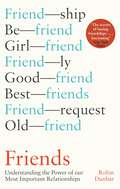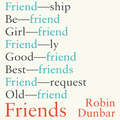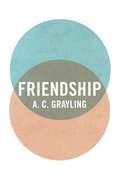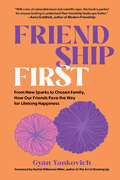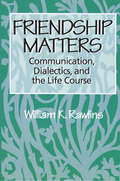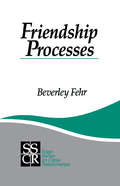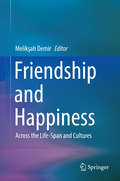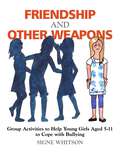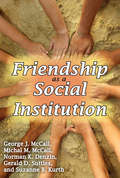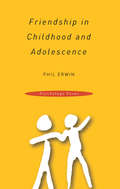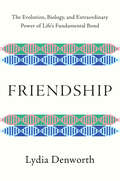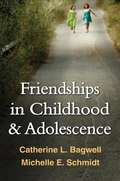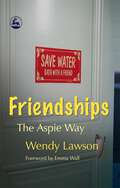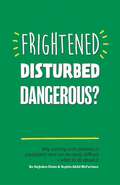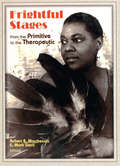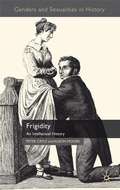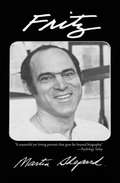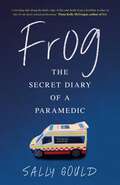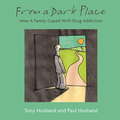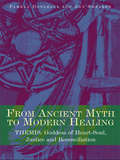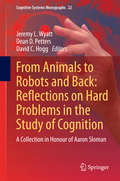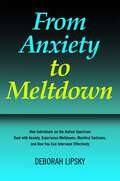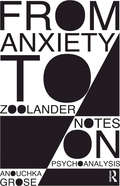- Table View
- List View
Friends: Understanding the Power of our Most Important Relationships
by Robin DunbarFriends matter to us, and they matter more than we think. The single most surprising fact to emerge out of the medical literature over the last decade or so has been that the number and quality of the friendships we have has a bigger influence on our happiness, health and even mortality risk than anything else except giving up smoking.Robin Dunbar is the world-renowned psychologist and author who famously discovered Dunbar's number: how our capacity for friendship is limited to around 150 people. In Friends, he looks at friendship in the round, at the way different types of friendship and family relationships intersect, or at the complex of psychological and behavioural mechanisms that underpin friendships and make them possible - and just how complicated the business of making and keeping friends actually is.Mixing insights from scientific research with first person experiences and culture, Friends explores and integrates knowledge from disciplines ranging from psychology and anthropology to neuroscience and genetics in a single magical weave that allows us to peer into the incredible complexity of the social world in which we are all so deeply embedded.Working at the coalface of the subject at both research and personal levels, Robin Dunbar has written the definitive book on how and why we are friends.
Friends: Understanding the Power of our Most Important Relationships
by Robin Dunbar'Fascinating...In essence, the number and quality of our friendships may have a bigger influence on our happiness, health and mortality risk than anything else in life save for giving up smoking' Guardian, Book of the DayFriends matter to us, and they matter more than we think. The single most surprising fact to emerge out of the medical literature over the last decade or so has been that the number and quality of the friendships we have has a bigger influence on our happiness, health and even mortality risk than anything else except giving up smoking.Robin Dunbar is the world-renowned psychologist and author who famously discovered Dunbar's number: how our capacity for friendship is limited to around 150 people. In Friends, he looks at friendship in the round, at the way different types of friendship and family relationships intersect, or at the complex of psychological and behavioural mechanisms that underpin friendships and make them possible - and just how complicated the business of making and keeping friends actually is.Mixing insights from scientific research with first person experiences and culture, Friends explores and integrates knowledge from disciplines ranging from psychology and anthropology to neuroscience and genetics in a single magical weave that allows us to peer into the incredible complexity of the social world in which we are all so deeply embedded.Working at the coalface of the subject at both research and personal levels, Robin Dunbar has written the definitive book on how and why we are friends.
Friendship
by A. C. GraylingA central bond, a cherished value, a unique relationship, a profound human need, a type of love. What is the nature of friendship, and what is its significance in our lives? How has friendship changed since the ancient Greeks began to analyze it, and how has modern technology altered its very definition? In this fascinating exploration of friendship through the ages, one of the most thought-provoking philosophers of our time tracks historical ideas of friendship, gathers a diversity of friendship stories from the annals of myth and literature, and provides unexpected insights into our friends, ourselves, and the role of friendships in an ethical life. A. C. Grayling roves the rich traditions of friendship in literature, culture, art, and philosophy, bringing into his discussion familiar pairs as well as unfamiliar--Achilles and Patroclus, David and Jonathan, Coleridge and Wordsworth, Huck Finn and Jim. Grayling lays out major philosophical interpretations of friendship, then offers his own take, drawing on personal experiences and an acute awareness of vast cultural shifts that have occurred. With penetrating insight he addresses internet-based friendship, contemporary mixed gender friendships, how friendships may supersede family relationships, ones duty within friendship, the idea of friendship to humanity, and many other topics of universal interest.
Friendship First: How To Make Your Friends Matter The Most
by Gyan YankovichOur friends enrich every part of our lives. Now you can make them matter the most. Despite modern technology and the ample ways we have to keep in touch, we risk neglecting our relationships with the people who have the most profound effect on our well-being: our friends. Weaving together personal stories, interviews with experts, and social research, Friendship First empowers you to nurture relationships with friends both new and old. Journalist Gyan Yankovich reveals how friendships play a vital role in our happiness with insights on how to: Deepen workplace friendships outside the office Invite friends into activities typically reserved for families Use social media to strengthen connections Maintain friendships through major life transitions. An ode to group chats and chosen family, Friendship First invites you to care for and count on those who matter most.
Friendship Matters: Communication, Dialectics, And The Life Course
by William RawlinsIn this volume, Dr. Rawlins traces and investigates the varieties, tensions, and functions of friendship for males and females throughout the life course. Using both conceptual and illustrative chapters, the book portrays the degrees of involvement, choice, risk, ambivalence, and ambiguity within friendships, and explores the emotional texture of interactions among friends. A concluding section examines the prospects for friendship in the course of our post-modern blurring of public and private domains and discursive sites.
Friendship Processes
by Beverley FehrThis broad-ranging volume examines how friends give meaning to our lives. Each phase of the friendship process is illustrated with empirical research. The result is a conceptual framework that illuminates the fascinating components involved in making friends, becoming close and keeping friends, and in friendships deteriorating and dissolving.
Friendship and Happiness
by Melikşah DemirThis is the first book that explicitly focuses on the relationships between various types of friendship experiences and happiness. It addresses historical, theoretical, and measurement issues in the study of friendship and happiness (e. g. , why friends are important for happiness). In order to achieve a balanced evaluation of this area as a whole, many chapters in the book conclude with a critical appraisal of what is known about the role of friendship in happiness, and provide important directions for future research. Experts from different parts of the world provide in-depth, authoritative reviews on the association between different types of friendship experiences (e. g. , friendship quantity, quality) and happiness in different age groups and cultures. An ideal resource for researchers and students of positive psychology, this rich, clear, and up-to-date book serves as an important reference for academicians in related fields of psychology such as cross-cultural, developmental and social.
Friendship and Other Weapons: Group Activities to Help Young Girls Aged 5-11 to Cope with Bullying
by Signe WhitsonLong before most school programs begin anti-bullying campaigns, young girls are getting a full education in social aggression. Girls as young as age five are experiencing acts of bullying, disguised as friendship, that shake the carefully laid foundations of their self-image, personal values, and beliefs about peer relationships. Based on thought-provoking discussions, engaging games, strength-discovering exercises, and confidence-boosting fun, the hands-on activities in Friendship and Other Weapons build critical knowledge and friendship survival skills such as: · Recognizing the Red Flags of Girl Bullying · Responding Assertively to Bullying Behavior · Realizing Personal Strengths · Becoming an Ally to Others Facing Bullying · Resolving Conflicts Directly · Using Technology and Social Media Ethically This photocopiable resource book provides educators, social workers and counsellors with a complete, ready-to-use group curriculum to help young girls aged 5-11 build constructive and fulfilling friendships.
Friendship as a Social Institution
by Michal McCallWhat is the social organization of love, friendship, rivalry, marriage, admiration, collegiality, parenthood, acquaintance, and clientage? How are these types of relationships similar and how do they differ? Few sociological works exist on relationships between friends, business partners, customers and clerks, mailmen and homeowners, and employers and employees, as social rather than role relationships. This classic book remains of interest because it focuses on voluntary personal relationships relationships that people need not enter, whose content is up to the participants, whose rules are what the participants agree they will be.The authors create an analytic framework within which to describe and compare the enormous range of relationships between two persons. They detail the shape and structure of such relationships, consider their organizational dynamics, their range and the nature of deviance in them, and point out analytical variables and dimensions upon which relationships can be located for comparative purposes. Organizational change in terms of how relationships are formed, developed, and transformed is covered, as is their function and dysfunction for the individual and society.By regarding social relationships consistently from the viewpoint of social organization theory, the book assimilates them to sociological concepts in general, but with an eye to the social psychological and organizational features that render them distinctive as a type. Friendship as a Social Institution sustains the study of friendship by making distinctions and outlining the problems connected with the study of social relationships.
Friendship in Childhood and Adolescence
by Phil ErwinFriendships are crucial to children's well-being and happiness and lay important foundations upon which later relationships in adolescence and adulthood are built. This clear, well-structured overview of the nature and significance of children's and adolescents' friendships examines issues such as the impact of social-cognitive development, relationship problems, and methods of promoting positive relationships.
Friendship: A Natural History
by Lydia DenworthA Next Big Idea Club Must-Read Nonfiction Book of Winter 2020 A revelatory investigation of friendship, with profound implications for our understanding of what humans and animals alike need to thrive across a lifetime. The phenomenon of friendship is universal and elemental. Friends, after all, are the family we choose. But what makes these bonds not just pleasant but essential, and how do they affect our bodies and our minds? In Friendship, science journalist Lydia Denworth takes us in search of friendship’s biological, psychological, and evolutionary foundations. She finds friendship to be as old as early life on the African savannas—when tribes of people grew large enough for individuals to seek fulfillment of their social needs outside their immediate families. Denworth sees this urge to connect reflected in primates, too, taking us to a monkey sanctuary in Puerto Rico and a baboon colony in Kenya to examine social bonds that offer insight into our own. She meets scientists at the frontiers of brain and genetics research and discovers that friendship is reflected in our brain waves, our genomes, and our cardiovascular and immune systems; its opposite, loneliness, can kill. At long last, social connection is recognized as critical to wellness and longevity. With insight and warmth, Denworth weaves past and present, field biology and neuroscience, to show how our bodies and minds are designed for friendship across life stages, the processes by which healthy social bonds are developed and maintained, and how friendship is changing in the age of social media. Blending compelling science, storytelling, and a grand evolutionary perspective, Denworth delineates the essential role that cooperation and companionship play in creating human (and nonhuman) societies. Friendship illuminates the vital aspects of friendship, both visible and invisible, and offers a refreshingly optimistic vision of human nature. It is a clarion call for putting positive relationships at the center of our lives.
Friendships in Childhood and Adolescence
by Michelle Schmidt Catherine BagwellHighly readable and comprehensive, this volume explores the significance of friendship for social, emotional, and cognitive development from early childhood through adolescence. The authors trace how friendships change as children age and what specific functions these relationships play in promoting adjustment and well-being. Compelling topics include the effects of individual differences on friendship quality, how friendship quality can be assessed, and ways in which certain friendships may promote negative outcomes. Examining what clinicians, educators, and parents can do to help children who struggle with making friends, the book reviews available interventions and identifies important directions for future work in the field.
Friendships: The Aspie Way
by Wendy LawsonPeople with Asperger's Syndrome have difficulty with interpersonal relationships, yet are well known to be loyal and dependable friends. Wendy Lawson felt she had a knack for upsetting people and was surprised to be told that she 'did friendship rather well'. In her frank and thoughtful analysis of what makes and breaks friendships, she explores what it means to have friends or be a friend - even a friend to oneself; what happens when times are tough and friends are scarce; whether one can be a 'good friend' without effort; and what other kinds of friendships there are, whether imaginary, animal or inanimate. These ideas are accompanied by practical examples, poetry and stories. Insightful and relevant to people both on and off the autism spectrum, Friendships: The Aspie Way is a fresh approach to a universal issue in human relationships.
Frightened, Disturbed, Dangerous?: Why working with patients in psychiatric care can be really difficult, and what to do about it
by Bo Hejlskov Elvén Sophie Abild McfarlanePatients in psychiatric care can behave in ways that can be alarming for staff, and difficult to respond to. The authors of this practical and imaginative book explain why patients may behave in these ways, and offer a toolkit of ways to respond effectively and kindly. With many everyday examples of how to keep the space positive and safe, and patients calm, this book could transform your working life.
Frightful Stages: From the Primitive to the Therapeutic
by Robert B. Marchesani E. Mark SternFace stage fright and self-doubt with new courage!The experience of awe has rarely been considered by psychologists, but this extraordinary book makes up for that neglect. Frightful Stages explores all the shades of that strange emotion from reverence to terror. At its heart, awe is the condition of human suffering in situations that require you to act in all the senses of that deceptively simple word, whether on stage or off, whether in the presence of many or alone.Frightful Stages provides a multifaceted view of the semiotics of awe. It deals with its manifestations in film, on stage, in poetry, in ordinary lives as well as in the more extraordinary ones, including Bessie Smith, Carl Van Vechten, Barbra Streisand, Federico Fellini, Thomas Merton, and John Ashbery. This unprecedented book delineates the experience of awe in moments of stage fright, performance anxiety, and everyday interpersonal relations. Frightful Stages takes place on and off stage, before the curtain and behind, in the audience and on the screen. It explores the mysterious experience of awe in a multitude of contexts, including: Thomas Merton's psychoanalytic showdown with Gregory Zilboorg the chronic tensions between Apollonian reason and Dionysian instinct in myth, psychoanalysis, creation, and performance the ill-fated encounter between the greatest of all blues singers and a brilliant, self-loathing literary critic the moment of awe in experiential psychotherapy as seen by both the analyst and client the differences and similarities between stage fright and social phobia the intricate interrelationships between pernicious envy, emotional awkwardness, and fear a personal diary chronicling one man's crisis of panic, anguish, and self-doubt the complexities of feeling, offering, and accepting reverence in the psychotherapeutic relationshipFrightful Stages gives clinicians and lay readers a variety of approaches from the analytic to the unanalytic, from the psychodynamic to the humanistic. It will appeal to a diverse audience, including therapists, clients, social theorists, cultural anthropologists, performers, and writers. Additionally, this book is intended to help artists deal with creative blocks, therapists cope with their own terrors, and all helping professionals understand bizarre phenomena.
Frigidity
by Alison Moore Peter CryleThis first major study of a curiously neglected term in the history of sexuality will intrigue students, scholars and enthusiasts alike. The authors take us through a journey across four centuries, showing how notions of sexual coldness and frigidity have been thought about by legal, medical, psychiatric, psychoanalytic and literary writers.
Fritz
by Martin ShepardFritz Perls described himself as a &“mediocre psychoanalyst&” who became &“the possible creator of a &‘new&’ method of treatment&”—Gestalt Therapy. His wife described him as half prophet, half bum. Dave Rybeck, reviewing FRITZ in Psychology Today, said that &“Martin Shepard has done an excellent job of getting into, on top of, and under the Fritz Perls mystique. He spent two years learning all he could about Perls&’s life and has produced a masterful yet loving portrait that goes far beyond biography. FRITZ offers a Fritz Perls to whom few, if any, were privy. This holistic view of Fritz, his early falterings, his neurotic rootlessness, his prima donna pettiness, his chronic self-doubts and, above all, his driving destiny to become a great master in the world of psychotherapy, reveals a human, lovable person. It leaves me feeling glad that Fritz did his thing. And that Martin Shepard did his, too.&”
Frog: The secret diary of a paramedic
by Sally Gould'A riveting ride along the knife edge of life and death from a frontline worker in one of our most crucial professions.' Fiona Kelly McGregor, author of Iris 'Frog', a term of endearment for intensive care paramedics, derives from the notion that everything they touch croaks. Sally Gould delivers a gripping and heartfelt memoir that dives into the unpredictable, often absurd, and sometimes heartbreaking reality of life as a paramedic. Life as a paramedic, writes Sally Gould in this candid, witty memoir, can be traumatic, gross, dull, hilarious, magical. To make the cut, you need to be able to think outside the square, keep calm in the midst of chaos, be in possession of a strong stomach, and simply brush it off when patients die. That&’s on top of having a profound understanding of the human body, plus the skills to counter its failings. It also helps to have a highly developed and oftentimes dark sense of humour. But behind the sirens and the life-or-death scenes, and the absurdity of non-urgent callouts, a paramedic&’s career is very different to how most people imagine it. Based on years of meticulously kept journals, Frog is an intimate look at the human cost of the job and the cumulative effect of trauma. Sally shares a personal story that is searingly honest and truly inspiring, one which offers a heartfelt tribute to the resilience, courage and camaraderie that define the high-stakes world of emergency medicine.
Frogs into Princes: Neuro Linguistic Programming
by Richard Bandler John Grinder John O. StevensIn one sense nothing that NLP can accomplish is new. There have always been "spontaneous remissions," "miracle cures," and other sudden and puzzling changes in people's behavior, and there have always been people who somehow learned to use their abilities in exceptional ways. What is new in NLP is the ability to systematically analyze those exceptional people and experiences in such a way that they can become widely available to others.
From A Dark Place: How A Family Coped With Drug Addiction
by Paul Husband Tony HusbandWhen the Husband family realised that their son Paul was addicted to heroin, they did everything they could to help him but it seemed that every step in the right direction would be followed by another relapse as Paul lied to them, stole from them, and come close to losing his life.This illustrated title from award-winning cartoonist Tony Husband tells the tale of those dark days as they worked as a family to get Paul into the right sort of supportive environment where he could truly recover from his dangerous addiction, and move from that dark place to a brighter future.This inspiring and compelling story will appeal to anyone who has struggled with an addictive disorder, or any families or friends who have had to support someone through such a situation. Anyone who was touched by Tony's Take Care, Son - The Story of my Dad and His Dementia will be similarly moved and uplifted by From A Dark Place.
From A Dark Place: How A Family Coped With Drug Addiction
by Paul Husband Tony HusbandWhen the Husband family realised that their son Paul was addicted to heroin, they did everything they could to help him but it seemed that every step in the right direction would be followed by another relapse as Paul lied to them, stole from them, and come close to losing his life.This illustrated title from award-winning cartoonist Tony Husband tells the tale of those dark days as they worked as a family to get Paul into the right sort of supportive environment where he could truly recover from his dangerous addiction, and move from that dark place to a brighter future.This inspiring and compelling story will appeal to anyone who has struggled with an addictive disorder, or any families or friends who have had to support someone through such a situation. Anyone who was touched by Tony's Take Care, Son - The Story of my Dad and His Dementia will be similarly moved and uplifted by From A Dark Place.
From Ancient Myth to Modern Healing: Themis: Goddess of Heart-Soul, Justice and Reconciliation
by Ann Shearer Pamela DonleavyThis book is about the energy personified by the classical Greek goddess Themis, who brought her divine and natural 'right order' to gods and humans, and who still presides over law courts as the figure of Justice. In many Western countries today, the growing dis-ease in minds and bodies of individuals is often echoed in whole communities. Rather than coming together, they seem to split apart in anger and distress. But themis energy is equally powerful, and can work to bring together and to heal. From the battle of the Titans and Olympians to the oracle at Delphi and the banquet of the gods, the stories of the goddess weave through these chapters to illuminate how themis energy is at work today. The authors explore psychological healing in individuals and relate this to new research in neurocardiology on the subtle interactions of body and mind. They show how the international movement for restorative justice is drawing on the same healing tools to benefit victims and offenders alike. And they evoke the extraordinary story of the South African Truth and Reconciliation Commission, which shows the world how themis energy can help transform a ravaged society. This book deepens understanding of the psychological urge towards healing and wholeness which is as much a part of human beings as the urge to destroy. It offers exciting new insights into Jung's unique approach to the relationship between individual and collective psychology. It will appeal to psychologists who work with individuals and groups, to lawyers and others concerned with the failure of current criminal justice systems, and to people involved in religious, political and other groups that seek to build communities which can encompass and even celebrate diversity rather than rejecting it in fear.
From Animals to Robots and Back: Reflections on Hard Problems in the Study of Cognition
by Jeremy L. Wyatt Dean D. Petters David C. HoggCognitive Science is a discipline that brings together research in natural and artificial systems and this is clearly reflected in the diverse contributions to From Animals to Robots and Back. In tribute to Aaron Sloman and his pioneering work in Cognitive Science and Artificial Intelligence, the editors have collected a unique collection of cross-disciplinary papers that include work on: · intelligent robotics; · philosophy of cognitive science; · emotional research · computational vision; · comparative psychology; and · human-computer interaction. Key themes such as the importance of taking an architectural view in approaching cognition, run through the text. Drawing on the expertize of leading international researchers, contemporary debates in the study of natural and artificial cognition are addressed from complementary and contrasting perspectives with key issues being outlined at various levels of abstraction. From Animals to Robots and Back, will give readers with backgrounds in the study of both natural and artificial cognition an important window on the state of the art in cognitive systems research.
From Anxiety to Meltdown
by Deborah LipskyAnxiety is the root cause of many of the difficulties experienced by people on the autism spectrum, and is often caused by things such as a change in routine, or sensory overload. Deborah Lipsky takes a practical look at what happens when things spiral out of control, exploring what leads to meltdowns and and tantrums, and what can be done to help. Drawing on her own extensive personal experience and using real-life examples to explain how autistic people think, the author distinguishes between meltdowns and tantrums, showing how they are different, how each can begin, and most importantly, how to identify triggers and prevent outbursts from happening in the first place. Practical and simple solutions to avoiding anxiety are offered throughout, and these are accompanied by calming techniques and suggestions for dealing with tantrums when they occur. This book will be an essential read for those on the autism spectrum, their families and friends, professionals working with them, and anybody else with an interest in autism spectrum conditions.
From Anxiety to Zoolander: Notes on Psychoanalysis
by Anouchka GroseFrom Anxiety to Zoolander is a collection of writings on psychoanalytic themes. Each text was originally delivered as a talk, and the book aims to retain the informality and directness of the spoken word. While many of the chapters focus on clinical questions, they also speak about art, comedy, fashion, fame and fiction. Freudian and Lacanian theories are central, but the book as a whole is far from doctrinaire, with all areas of psychoanalytic thinking being up for discussion. Clinical topics include acting out, narcissism, gender, transference, diagnosis, and the Oedipus complex, tracing ideas through Freud and the post-Freudians, and examining their relevance to the contemporary psychoanalytic clinic. Non-clinical topics include Louise Bourgeois's notes on her analysis, stand-up comedy, Paris Hilton's televised friendship auditions, and Ben Stiller's penetrating stupidity in Zoolander 2. While each essay is self-contained, the book argues overall for the continued relevance of Freudian ideas in the treatment of psychic suffering, as well as in the interpretation of cultural phenomena.
